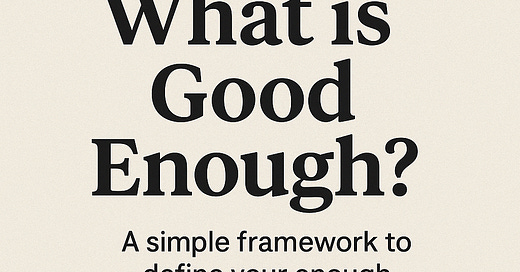I started playing pickleball recently. I’m not very good at it but I have fun.
Then, I came across something that made me pause: a rating system. Players are scored on a scale of 1.0 to 5.5. Suddenly, my chill weekend activity had the potential to become measurable and competitive
Pickleball was recreation for me. I wasn’t looking to move up a ladder. Recreation was “good enough.”
But over the next few days, I couldn’t stop thinking about it. I started reading up on ratings. I chatted with my pickleball buddies about it. And one Sunday morning, I bit the bullet. I signed up thus joining the millions of players chasing that elusive number.
So what changed? Why did I sign up, if "recreation" was already good enough?
I realized something: I had never defined “good enough for what?”
Maybe I wanted the thrill of competition.
Maybe I wanted access to skill-based matches.
Maybe I just wanted to feel like I belonged in a group that was leveling up.
The truth is, my “good enough” was a moving target because I hadn’t clearly defined the outcome I was aiming for.
Ever find yourself caught in a whirlwind of “Is this good enough?”
Good enough job.
Good enough school.
Good enough marriage.
Good enough vacation (with just enough beach and Wi-Fi).
If your brain’s stuck in the tryouts of life - always comparing, always measuring then this simple model might help.
It’s not about lowering standards. It’s about living freely.
The “Good Enough” Formula
Here it is, in one line: ABC is good enough so that you can do XYZ in order to feel LMN.
Let’s unpack that.
ABC = the current thing you're evaluating (college, job, partner, house, city…)
XYZ = the outcome or action it enables (earn enough, spend time with family, have creative freedom…)
LMN = the emotion or mental state you truly want (peace, joy, security, freedom, meaning)
A Few Real-Life Examples
“This college is good enough for my child to earn enough to be happy.”
(ABC = college, XYZ = earn enough, LMN = happy)“This job is good enough for me to pay my bills so I can enjoy coaching my daughter’s soccer team and feel a sense of giving back.”
“This apartment is good enough so I can avoid a long commute and have more time to write.”
It connects your choice (what is) to your why and then to your well-being.
Satisficing: The Science of “Good Enough”
Herbert Simon, Nobel Prize winner, introduced the concept of “satisficing” i.e. choosing an option that’s good enough rather than the best possible.
Satisficers tend to have:
Lower levels of anxiety
More happiness and life satisfaction
Better decision outcomes (because they make a decision!)
Satisficing isn’t slacking. It’s being strategic about drawing boundaries.
Your Own “Good Enough” Sentence
Take a decision you're wrestling with, and try this:
“______ is good enough so that I can ______ in order to feel ______.”
“Having some pickleball rating is good enough so that I can play more games with appropriate skill levels in order to feel the joy of the game”
Closing Thoughts
“Good enough” is never just about the thing. It’s about what that thing makes possible and whether that possibility aligns with your deepest values.
So next time your mind says, “But what if there’s something better?”
Try asking instead - “Is this good enough for the life I want to live?”
Chances are, it is. And interestingly, that’s maybe more than enough!
If this post brought you clarity, share it with someone stuck in decision purgatory. And if you want to get more tools like this for a life that’s not perfect, but good enough, subscribe to the newsletter.




